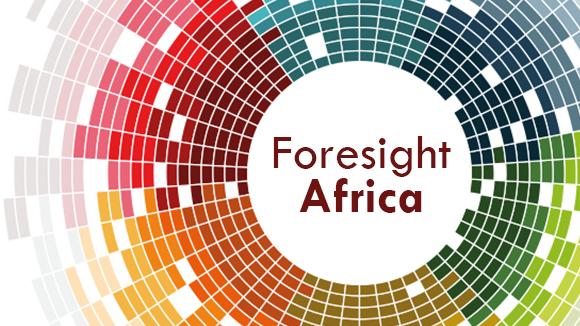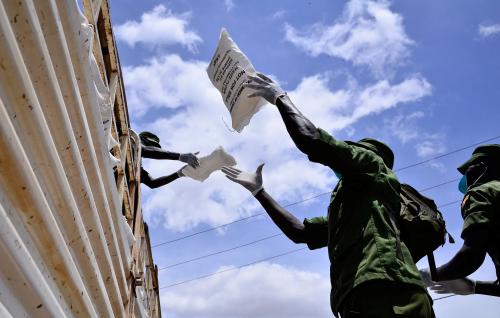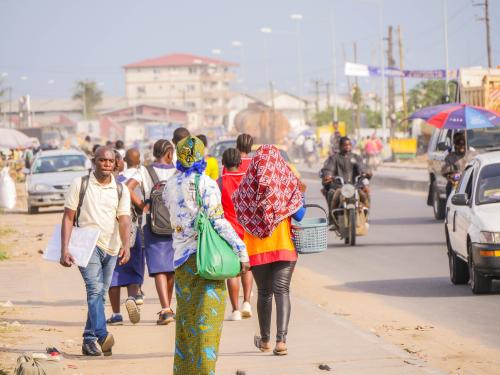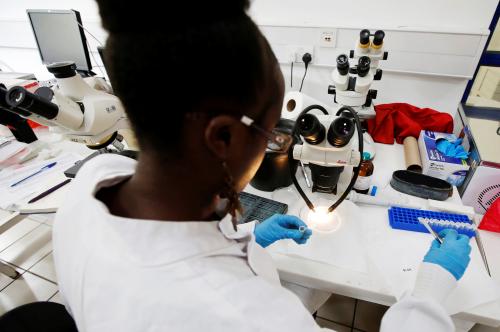Below is a viewpoint from the Foresight Africa 2022 report, which explores top priorities for the region in the coming year. Read the full chapter on Africa’s economic recovery.
 The outpouring of generosity on the African continent in response to the COVID-19 pandemic has been tremendous. Not only have private donors increased their giving, African countries have also witnessed the rapid advancement of new tools and vehicles for giving, including impact investments, collective giving, and pooled funds.
The outpouring of generosity on the African continent in response to the COVID-19 pandemic has been tremendous. Not only have private donors increased their giving, African countries have also witnessed the rapid advancement of new tools and vehicles for giving, including impact investments, collective giving, and pooled funds.
Despite this progress, addressing the urgent humanitarian issues in the region requires an acceleration of efforts to harness private sector resources from individual donors, foundations, and corporations.
Still, as the most recent Global Philanthropy Environment Index (GPEI) reveals, significant challenges to expanding philanthropic flows in sub-Saharan Africa persist (Figure 1.6). The index, which measures the global philanthropic environment by using a standard instrument completed by country-based experts, examines the incentives and barriers that could impact individuals’ and organizations’ philanthropic efforts.
Not only have private donors increased their giving, African countries have also witnessed the rapid advancement of new tools and vehicles for giving, including impact investments, collective giving, and pooled funds.
In the most recent index, the country-level experts based in sub-Saharan Africa submitted scores below the global average on all five components, including ease of operating a philanthropic organization (3.47), tax incentives (3.33), cross-border flows (3.00), and socio-cultural environment (3.50). The political environment for philanthropy (2.75) also imposes constraints. While the experience of these six countries should not be generalized to the entire continent, it is worth noting some broad themes experts reported, including: increasing barriers to cross-border flows; lack of government support for civil society organizations; increasing scrutiny of philanthropic organizations focusing on advocacy, democratization, and human rights; and political instability, among others. Additionally, in some countries, cross-border giving faces significant challenges due to changes in policies or regulations, often to meet international requirements on anti-money laundering and combating financing of terrorism.
While the index primarily measures the environment for institutionalized philanthropy, it is important to highlight that, despite the low scores, generosity and informal philanthropy are significant on the African continent. The various religious roots, as well as traditional and cultural heritages contribute to a culture of generosity across societies.
Another positive trend in philanthropy is the emergence of tools to encourage and facilitate such giving. Indeed, technology has led to new ways of giving through social media, crowdfunding platforms, and mobile giving. Such tools could facilitate fundraising activities and serve as a catalyst for domestic giving.
Generosity and informal philanthropy are significant on the African continent. The various religious roots, as well as traditional and cultural heritages contribute to a culture of generosity across societies.
In addition, diaspora communities have contributed both philanthropic flows and volunteer talent in key areas such as education, health, and climate mitigation. For example, universities are connecting with African donors throughout the continent—not just alumni—and these new donors are in turn engaging their professional networks to support African universities.
Given these emerging and unprecedented trends in giving, policymakers, researchers, and givers need new analytical capacities to fully understand the scope of global private giving in such an unprecedented context and ensure that a well-functioning philanthropic ecosystem allows givers to make a difference.
Key insights and recommendations
While giving in Africa by both internal and external groups is on the rise, such efforts still encounter obstacles in cases where national policies constrain the ease of operating (such as Zimbabwe) or ability to send or receive funds across borders (as in Kenya). With the additional complexity of the COVID-19 pandemic, the Lilly Family School of Philanthropy asked an international group of experts working in nonprofits, academic institutions, foundations, corporations, and government to share insights on national-level responses to the crisis. Their insights and recommendations are below:
- We need to strengthen cross-sector collaborations. Increased, intentional partnership across sectors—between nonprofit sectors and governments, but also regional and global partnerships—will be critical to societies’ ability to respond to the cascading health and economic crises brought about by the pandemic.
- Funders should actively engage grassroots organizations and leaders. Grassroots organizations, local communities, and volunteers have spearheaded initiatives, especially when lockdowns or tightened restrictions prevented nonprofits from reaching out.
- Nonprofit organizations can benefit from less restrictive funding sources. Nonprofit sectors need more flexible funding sources, reporting requirements, and unrestricted funding to drive change. Many funders pledged to make funds available quickly, and experts recommend that these changes should remain in place.
- Funders must address long-standing disparities. The pandemic has disproportionately impacted vulnerable groups, including women and girls. Unrestricted funding will help organizations respond quickly to areas of greatest need.
These recommendations emphasize the need for bold action to catalyze private giving: We must expand effective governmental collaborations with nonprofits and funders, enlist the assistance of grassroots organizations, and reduce barriers to private and collective giving.
Drawing on a long culture of giving in sub-Saharan Africa, COVID-19 provides unprecedented opportunities to boost recovery by accelerating the movement towards a just, equitable, and prosperous continent.
The Brookings Institution is committed to quality, independence, and impact.
We are supported by a diverse array of funders. In line with our values and policies, each Brookings publication represents the sole views of its author(s).










Commentary
Philanthropy plays a vital role in meeting development challenges and mitigating crises in sub-Saharan Africa
March 8, 2022